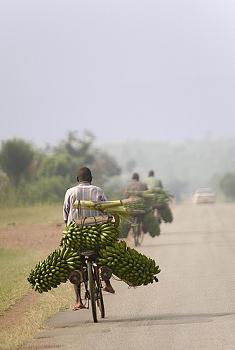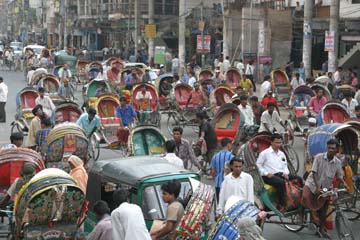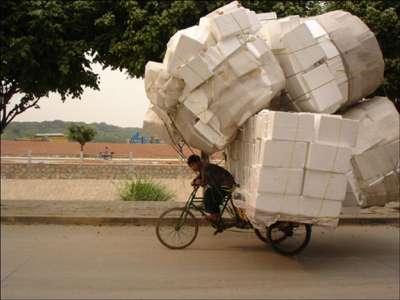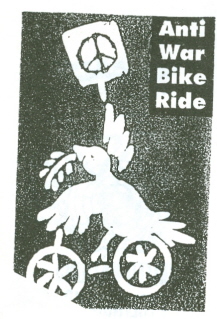Many projects and organizations that work to bring bicycles to third world countries use them as a vehicle to promote peace and provide an alternative in technology to practices of warfare and environmental destruction. Individuals do what they can to promote peace through their love of bicycles. Some even embark on bicycling trips around the world fundraising and sending anti-war messages. The bicycle has in this way become a symbol of peace that can be tangibly delivered to developing countries.
 Bikes Not Bombs
Bikes Not Bombs
The potential offered by bicycles in many African countries is tremendous. In rural Kenya, for instance, women will often spend between 3-6 hours walking to get water, which requires about a quarter of their daily energy intake. Bicycles would reduce this time by at least a half and energy expenditure by a third. Unfortunately the bike has not caught on well in most African villages. Most production occurs in Europe or America and is then sent over to Africa. A recent article in The Economist describes a new project that will produce bamboo bikes in Ghana, using local resources. Bamboo is known to be light and durable with a high tensile strength. A problem with integrating these bicycles, and ones sent through other organizations, sent over from developed countries, is the lack of existing infrastructure for bicycles. Just as we see this as a problem in America (refer to Effects on Community Design and Infrastructure), it is an even bigger issue in Africa where potholes are plentiful and helmets are rare.
Efforts are being made by the governments of these developing countries as well, not just western countries. The South African government has instituted a program where they hope to get one million bicycles out to women by 2015. Obstacles to this program are cultural, as woman in many rural areas are expected to maintain their domestic role. One South African woman commented "It's easy to cycle, it's...difficult to ignore people's comments about a woman on a bike...I have to muster my courage to ride." This is a barrier that is more difficult to overcome, cannot be facilitated by Western societies, and is a gradual process needing to occur over a long period of time.
 bbc.co.ok
bbc.co.ok
On the other side of the spectrum, in Bangladesh, there is an abundance of bicycle rickshaws—three wheeled human powered vehicles that are able to transport goods or passengers. The country is estimated to have over 300,000 of these human powered vehicles. This business has becomes a family one, allowing one vehicle to have a rotation of pullers, who can range in age from 8 to 80. It serves therefore as a source of income for nearly 3 million people in the city of Dhaka alone. These pullers are well respected and called "princes of the road" by some due to their importance in commuting and transporting within the city. Because of the predominance of bicycles, the streets are filled with rickshaw traffic (as seen in the image below) that is often chaotic due to the lack of infrastructure and organization. (banglapedia.com)
 Banglapedia.com
Banglapedia.com
Perhaps this image is a slight exaggeration and borders on humorous, but it demonstrates the possibilities that lie within bikes as a means of load transport. World Bike recently designed a model of bicycle called Big Boda which emphasizes efficiency, ease, strength and affordability ($110). The thin, steel frame saves weight and creates an extended base for a large load or extra passengers.
 yourscienceblog.blogspot.com
yourscienceblog.blogspot.com
 "Bike Cult" by David Perry
"Bike Cult" by David Perry

Back to The Bicycle homepage
